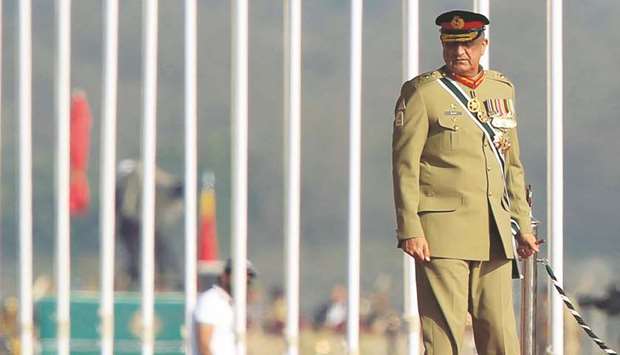Chief of Army Staff General Qamar Javed Bajwa has said that the country had fought hard to attain peace and now it must look to turn this peace into prosperity and development.
His address came during an investiture ceremony at the army’s General Headquarters in Rawalpindi, on the occasion of the 55th Defence Day on Sunday.
During the ceremony, the army chief conferred military awards to army personnel for acts of gallantry during various operations.
“Families of shuhada/ghazis and senior serving military officers/soldiers also attended the ceremony,” said a press release by the Inter-Services Public Relations (ISPR). The military’s media wing said that 40 officers were awarded the Sitara-e-Imtiaz (Military), 24 officers and soldiers were awarded the Tamgha-e-Bisalat, and one soldier was awarded the United Nations Medal.
The medals of the martyred were received by their family members.
Addressing the gathering, Bajwa said that Pakistan had faced great trials over the last 20 years, with war on the eastern and western fronts.
He said that the country also faced natural disasters, such as floods and earthquakes, and the war on terror.
Bajwa said that thousands of people were displaced, and many sacrificed their lives.
He also noted that the country successfully fought against the coronavirus pandemic and the locust attack.
The army chief said that in all those “challenging times”, the country did not lose hope and fought against the trials head-on.
He said that due to these sacrifices, Pakistan was peaceful today.
“Now we have to turn this peace into prosperity and development.
As a nation, we have to fight for it,” said Bajwa, adding that the country will have to adopt the principles of unity, faith, and discipline and follow Quaid-e-Azam’s directives to “work, work and just work”.
The general also warned the nation of the perils of fifth-generation or hybrid warfare, saying that its aim is to “discredit the country and the armed forces, and to spread chaos”.
“On this occasion, I would like to turn your attention to another challenge.
This challenge has been imposed on us through the fifth generation or hybrid war,” said the army chief.
He vowed that the army would fight against the threat with the support of the nation and emerge victorious.
The army chief said that Pakistan seeks peace in the region, adding that the country’s key efforts in Afghanistan are a testament to this.
He also warned that Pakistan would not be “intimidated” by the stockpiling of newly-acquired weapons by a neighbouring nation.
“The armed forces of Pakistan are fully equipped, vigilant and aware,” he noted, adding that they would respond befittingly to any move made by the enemy with full force.
“Pakistan is a living reality: our blood, passion, action will provide proof of this on every front,” said the army chief.
He reiterated that while Pakistan is a peace-loving nation, if war is imposed on it, it would give a stronger response than the enemy.
“We showed this by responding to the failed Balakot attack,” said Bajwa.
The army chief said that Pakistan’s armed forces made a lot of sacrifices across the world for peace.
“The world acknowledges the sacrifices of the armed forces,” he said.
Bajwa added that September 6, 1965, was an “immortal chapter” in Pakistan’s history.
The army chief said that numerous stories of solidarity, patriotism, sacrifice and bravery came to the forefront on that day, adding that what transpired was a “testament to our courage”.
Bajwa said that the day was observed throughout the country to remember the martyrs of 1948, 1965, 1971 and Kargil wars.
“This day reminds us that we defeated an enemy much bigger than us.
“We are ready today as well to defeat the nefarious plans of the enemy,” Bajwa said.
The army chief said that he salutes the families of the martyrs and assured them the country will never forget their sacrifices.
“Our martyrs are our heroes,” said Bajwa, adding that nations that forget their heroes are forgotten in history.

General Bajwa: As a nation we have to fight... to turn this peace into prosperity and development.
